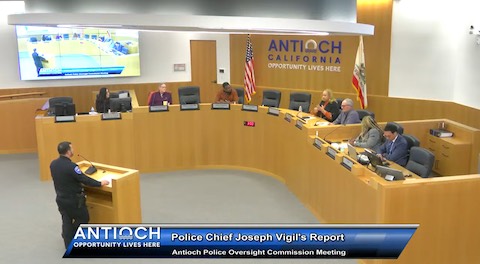
13 Nov Antioch Police Won’t Be Expanding A.I. Use, For Now

(Screenshot captured by Samantha Kennedy / The CC Pulse)
By Samantha Kennedy
Antioch Police won’t be diving further into the world of artificial intelligence for now, but it is something the department has considered.
Lt. Bill Whitaker told the Police Oversight Commission on Oct. 3 that A.I. is only something the department is “looking into.”
“It would ultimately be the chief’s decision, and I would guess he’s shaking his head no behind me because it’s not something we care [to use],” said Whitaker.
Law enforcement agencies have increasingly incorporated A.I. into operations in recent years to speed up operations, which proponents say is meant to free up time for officers to work on other tasks.
Some technology APD already uses or has included in its contracts use different types of A.I.
Automated License Plate Readers, better known as ALPRs; ShotSpotter, a gunshot detection technology; and a redaction assistant through its contract with Axon Enterprises are A.I. technologies that APD currently uses. Through Axon’s redaction assistant, APD can identify and blur faces and other visual or audio items that cannot be released due to privacy.
Something not included in that Axon contract, which was extended in August, is the company’s Draft One technology that uses generative A.I. to write police reports for officers.
Whitaker told commissioners that the department does have a draft of a policy that would allow officers to use A.I. in the assistance of writing police reports.
“But we’re not there yet,” said Whitaker.
Agencies in San Francisco, Campbell and East Palo Alto have made use of the Draft One technology, with varying responses from community members and mass surveillance critics. When it was discovered the San Francisco Police Department was testing out the technology, critics said the decision had the potential to lead to “abuses of power.”
In October, Gov. Gavin Newsom signed a bill that will require law enforcement agencies to disclose if A.I. was used to write a report. It will go into effect Jan. 1.
Vice Chair Devin Williams said his concerns with A.I. come from prejudice seen in Palantir Technologies’ systems, noting that it was “not 100% free of racial bias.”
Commissioner Lisa Elekwachi said she hoped APD could meet with residents and the city before moving forward with any A.I. tools.
“So we have policies in place and we know exactly how we’re going to move with this stuff because it is coming fast,” said Elekwachi. “We want to get ahead of the game.”



No Comments